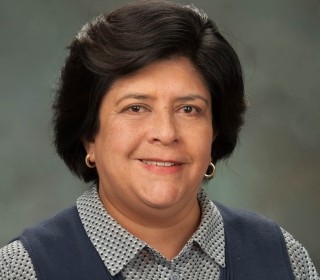Newswise — When individuals appear in Buffalo Immigration Court, they often feel afraid and unsure of what to expect. This is where Graziela Rondón-Pari, Buffalo State College assistant professor of Spanish, steps in. As a certified Spanish court interpreter, she not only translates for the defendants but also helps ease their uncertainty.

“People are brought in from all over the country for all sorts of cases,” said Rondón-Pari, who joined the college’s Modern and Classical Languages Department in 2018. “Usually, they’re seeking asylum. Some have been discovered to be in the country illegally; others are pursuing a green card, usually when marrying a U.S. citizen.
“In the last couple of years, we’ve seen a lot of issues with children being separated from their parents at the border, which is heartbreaking.”
Originally from Perú, Rondón-Pari first came to the United States as an undergraduate through an exchange program with Augustana College in Rock Island, Illinois. Even though she has been in this country legally for decades, she said, she can empathize with the individuals going through the court system. This is why she continues to spend her summers as a court interpreter in Buffalo, New York City, and Baltimore, Maryland.
Her foray into the New York State Unified Court System began more than 20 years ago, when she was pursuing a doctorate in foreign and second language education at the University at Buffalo. An attorney with Prisoners’ Legal Services of New York invited her to accompany him to Attica Correctional Facility to interpret for a Spanish-speaking inmate.
“I looked at it as an adventure,” Rondón-Pari said. “Later, I translated letters inmates wrote to the attorneys at Prisoners’ Legal Services.”
That adventure prompted her to become certified as a Spanish court interpreter. She first landed a position with Buffalo City Court, where she soaked up knowledge of the court system. She was one of only four interpreters in the city.
“At that time, there were few professional guidelines for court interpreters,” she said. “You used to be able to communicate with the person who needed interpretation services in a court case—a witness or victim—freely. Now, the parameters are very strict. The interpreters cannot be involved with any parties within the courtroom. They must sit next to the judge at immigration court.”
After finishing her Ph.D. and joining the faculty of Ithaca College and then SUNY Brockport, Rondón-Pari became a senior court interpreter, a position she still holds. She applies her skills to legal procedures at immigration offices throughout the United States and the Immigration Detention Center in New York City and trains other interpreters from all over the country.
Now, she is passing along these skills to Buffalo State Spanish majors interested in becoming court interpreters. She’s developed courses in English-Spanish court interpretation and assisted the MCL Department in creating an undergraduate certificate program in Spanish court interpretation. Buffalo State President Katherine Conway-Turner recently approved the program, which now must advance to SUNY System Administration and the New York State Education Department for final review.
Five courses within the Spanish discipline compose the program. In each course, students visit different state and federal courts to observe the proceedings.
“Because I have longstanding, personal relationships with judges,” Rondón-Pari said, “they allowed me [prior to COVID] to bring up two students at a time to court with me.”
The certificate culminates with a practicum at Buffalo City Court for students to employ their interpreting skills and familiarize themselves with daily court operations.
If approved, the Spanish court interpretation certificate would be a standalone certificate, culminating with students taking the New York State court interpreting test, Rondón-Pari explained. She added that she’s also working with the Buffalo Immigration Court and local law firmsto develop internships for students.
“The need for interpreters in this area is so great thatthe Buffalo Immigration Court is recruiting interpreters from as far away as California and Florida,” she said. “For our students, this certification would mean a very satisfying career in a well-respected and well-paying profession.”
There is a learning curve at first, however, and Rondón-Pari said she is happy to help students navigate it.
“When I started, I had to learn everything on my own about the court system, about the ethics and daily court operations,” she said. “That’s something my students will not have to figure out on their own. They’ll have someone to guide them through every step of the process.”
